I have some interesting scrawled notes from a train conversation with Richard earlier today. He was talking about software engineering management (don’t go away, I’m going to relate it to other things in a moment), and how there is a scale upon which you can slide too far one way and things go wrong. This is about varying how much managers tell their staff about what is happening:
Insufficient information given to workers < ----------> Too much information given to workers
The information here is detail about goals and motives, about why the software is to be like the spec/design. If you tell them too much about this, rather than just giving unjustified orders, then they spend ages worrying about it and don’t do their job. If you give too little, they will either not do what you say, or worse do exactly what you say, obeying your precise orders letter for letter. Either way the software won’t achieve the goals because the programmers can’t incorporate them in every creative decision they make at every level. Richard says this is what goes wrong with most software projects.
Here is another way of looking at the scale:
Hierarchy < ----------> Network
One way of analysing political power is to think of it as coming in three forms. These are hierarchies (think inside a multinational corporation or scientology), networks (think an old boys club of company directors, or a workers co-operative), markets (think buying vegetables from a choice of farmers). These all mesh in a great recursive tangle with each other, which I won’t get distracted into describing now.
Now, just ordering your workers about without explanation is an extreme form of hierarchy. Letting your workers know everything that you know, and letting them make all decisions is an extreme form of a network. The slider is the same, and it applies to any organisation.
It also applies inside you, yourself, and how you decide things:
Acting on gut instinct < ----------> Thinking hard, getting too much info
Some people are prone to over-analysis and never take any action. They are stuck too far to the right of the scale, investigating in detail the causes, theory, opinions on a political issue before actually doing anything about it. Of course, you can never fully understand everything, you are always riddled with doubt, and so you do nothing.
On the other hand, many unthinkingly sit on the left of our scale. They always do what comes naturally to them, so are over-exposed to, say, advertising and other manipulation by the society that they live in. They probably make good soldiers, or good hedonists.
There’s a sweet spot in the middle where you balance action with research. If you are working alone, you have to go further to the left or else you’d never get anything done. If you are a large corporation, you can go further right because of division of labour, and the extra benefits of scale when you do improve something by thinking harder.
Final amusing thing. Even the most junior programmer is really a manager whose staff are stuck infinitely far to the left on our scale. The computer obeys their exact orders, taking no account of the programmer’s goals, to the absurd extent of crashing and failing in a way even the most obedient soldier never would. When you manage people, you are working more over to the right. Perhaps this partly explains why programmers who become managers instinctively manage without giving information about goals, as that is how they are used to “managing” the software that they write.
Software is totally obedient < ----------> People think about what you tell them
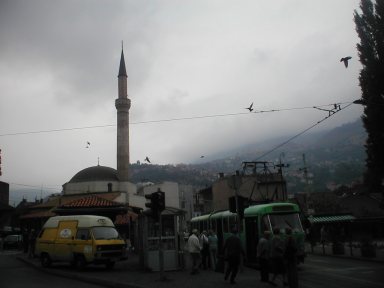 Sarajevo (first photo) was absolutely astonishing. I arrived unknowningly some way out of town at an eastern bus station, and was amazed by the taxi ride through what seemed like a teaming metropolis. I’d expected it to be rundown and wartorn, but by night it was a thriving European capital. After leaving my luggage at the private room I was staying in, I walked round the town to find somewhere to have dinner. I stumbled upon the most beautiful mosque (Gazi Husref-Bey). The courtyard was tranquil, with a few people sitting about in quiet contemplation.
Sarajevo (first photo) was absolutely astonishing. I arrived unknowningly some way out of town at an eastern bus station, and was amazed by the taxi ride through what seemed like a teaming metropolis. I’d expected it to be rundown and wartorn, but by night it was a thriving European capital. After leaving my luggage at the private room I was staying in, I walked round the town to find somewhere to have dinner. I stumbled upon the most beautiful mosque (Gazi Husref-Bey). The courtyard was tranquil, with a few people sitting about in quiet contemplation.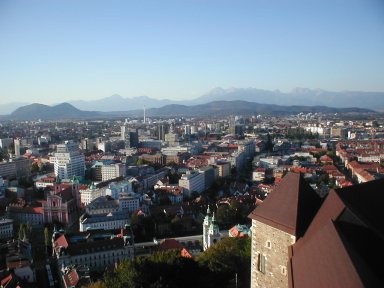 I was most surprised that Bosnia felt in such better condition than Albania. Albania did have a small civil war in 1997, but nobody was killed. Bosnia suffered years of war and genocide. Somehow the international community is paying attention to Bosnia, with EU grants for reconstruction, a large UN presence, and busy aid agencies. Albania didn’t have a noticeable foreign presence, despite its recent relation to the Kosovo war. I speculated that Sarajevo would be such a pleasure to live in, a real ancient European city, whereas Albania was more like a run down desert. Perhaps this influences which country creates the largest sentiment in donating western Europeans, and which country diplomats and aid workers prefer to have to go to.
I was most surprised that Bosnia felt in such better condition than Albania. Albania did have a small civil war in 1997, but nobody was killed. Bosnia suffered years of war and genocide. Somehow the international community is paying attention to Bosnia, with EU grants for reconstruction, a large UN presence, and busy aid agencies. Albania didn’t have a noticeable foreign presence, despite its recent relation to the Kosovo war. I speculated that Sarajevo would be such a pleasure to live in, a real ancient European city, whereas Albania was more like a run down desert. Perhaps this influences which country creates the largest sentiment in donating western Europeans, and which country diplomats and aid workers prefer to have to go to.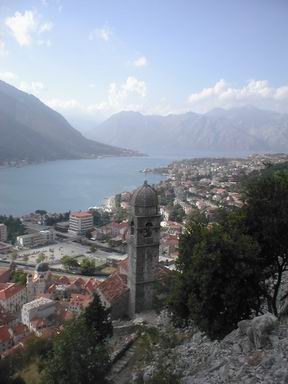 I quickly visited the ancient ruins of Butrint in the south-west, which were a bit disappointing. Tirana, the capital of Albania, was even more so. I arrived too near sunset, with the guidebooks both warning you to be careful going out at night, at least in the suburbs. In a rush, I found a decent hotel and then went out to buy a newspaper and get some food.
I quickly visited the ancient ruins of Butrint in the south-west, which were a bit disappointing. Tirana, the capital of Albania, was even more so. I arrived too near sunset, with the guidebooks both warning you to be careful going out at night, at least in the suburbs. In a rush, I found a decent hotel and then went out to buy a newspaper and get some food.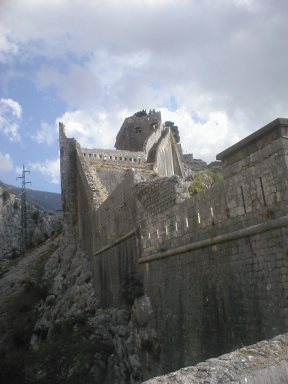 I thought about it a while, and ate my food. In the end instinct kicked in, having been bought up in the liberal tradition of giving to charities rather than individuals. I waited until we had finished our meal, paid for it (so he got a meal out of me), apologised and left. I’ll never know if it was true, how can you know? Or the consequences of my inaction if it were. How many people are really in that sort of situation every day, in the whole world? Even one is too many.
I thought about it a while, and ate my food. In the end instinct kicked in, having been bought up in the liberal tradition of giving to charities rather than individuals. I waited until we had finished our meal, paid for it (so he got a meal out of me), apologised and left. I’ll never know if it was true, how can you know? Or the consequences of my inaction if it were. How many people are really in that sort of situation every day, in the whole world? Even one is too many.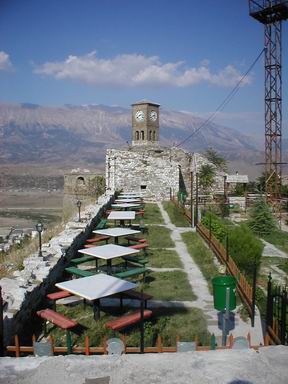 Land borders are always fascinating places, and the one between Greece and Albania was no exception. The bus services are awkward or non-existent to border posts in this part of the world, so you have to hire a taxi to drop you off there.
Land borders are always fascinating places, and the one between Greece and Albania was no exception. The bus services are awkward or non-existent to border posts in this part of the world, so you have to hire a taxi to drop you off there.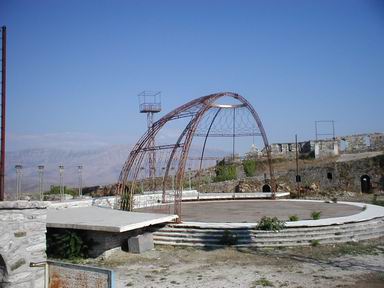 The castle has lots of curious history and uses, as you can see from these photos. The picnic tables are a derelict cafe, perhaps from when tourism was growing before the 1997 civil war. There are now again some day-trip tour buses from Greece. The strange dome is a theatre, used for the revived four-yearly Gjirokastra folk music festival. It was rusted and ruined. I had great fun poking round the deserted place. Examining the downed US fighter plane the communists proudly put up here in the 1950s. Trying to not be too scared of the gatekeeper’s dog, who hid barking in the dark depths of the arches, which contained a WWII weapons exhibition. Creeped by the too-recent barbed wire and cell courtyard, where the dictator Hoxha kept, and miskept, political prisoners.
The castle has lots of curious history and uses, as you can see from these photos. The picnic tables are a derelict cafe, perhaps from when tourism was growing before the 1997 civil war. There are now again some day-trip tour buses from Greece. The strange dome is a theatre, used for the revived four-yearly Gjirokastra folk music festival. It was rusted and ruined. I had great fun poking round the deserted place. Examining the downed US fighter plane the communists proudly put up here in the 1950s. Trying to not be too scared of the gatekeeper’s dog, who hid barking in the dark depths of the arches, which contained a WWII weapons exhibition. Creeped by the too-recent barbed wire and cell courtyard, where the dictator Hoxha kept, and miskept, political prisoners.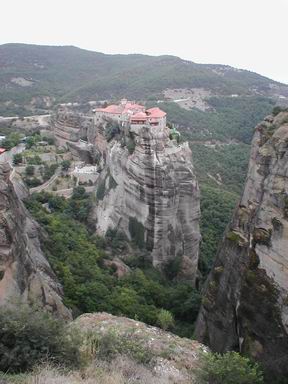 Just a quick post, as internet access is expensive here. Or at least it feels expensive as you have to put coins in a slot. I’m in Kalambaka towards the north of Greece. The attraction here are the impressive Meteora, huge pillars of rock topped by 14th century monastries.
Just a quick post, as internet access is expensive here. Or at least it feels expensive as you have to put coins in a slot. I’m in Kalambaka towards the north of Greece. The attraction here are the impressive Meteora, huge pillars of rock topped by 14th century monastries.